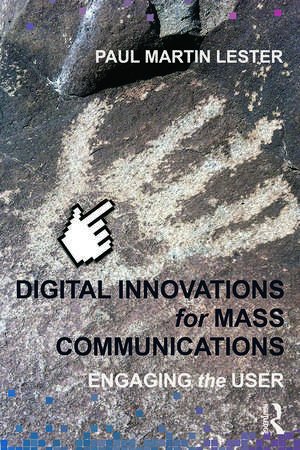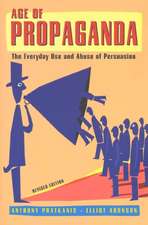Digital Innovations for Mass Communications: Engaging the User
Autor Paul Martin Lesteren Limba Engleză Paperback – 10 dec 2013
The sixteen chapters each include a brief introduction, assignments, simple-to-follow step-by-step exercises, and sources for additional information in which users will learn to produce apps, informational graphics, quick response codes, quizzes, simulations, smartphone and table icons, social media campaigns, three-dimensional pictures, and video. Students will work with the following programs: Blogger, Dreamweaver, Excel, Facebook, GeoCommons, Google Maps, Illustrator, Imgur, iMovie, Infogram, iShowU, JavaScript, JustGive, Kaywa, Kickstarter, LinkedIn, Onvert, Photoshop, Pixel Resort, QuickTime, Reddit, Second Life, SurveyMonkey, TheAppBuilder, Twitter, Vizualize, Wikipedia, Word, WordPress, and YouTube.
When digital innovations are added to traditional print and screen presentations, a media user is not only allowed to interact with the information but can also physically engage with the story displayed. Giving students the tools they need to transform their storytelling in this manner is the ultimate goal of this textbook.
| Toate formatele și edițiile | Preț | Express |
|---|---|---|
| Paperback (1) | 485.25 lei 6-8 săpt. | |
| Taylor & Francis – 10 dec 2013 | 485.25 lei 6-8 săpt. | |
| Hardback (1) | 824.40 lei 6-8 săpt. | |
| Taylor & Francis – 29 noi 2013 | 824.40 lei 6-8 săpt. |
Preț: 485.25 lei
Nou
Puncte Express: 728
Preț estimativ în valută:
92.88€ • 100.92$ • 78.07£
92.88€ • 100.92$ • 78.07£
Carte tipărită la comandă
Livrare economică 22 aprilie-06 mai
Preluare comenzi: 021 569.72.76
Specificații
ISBN-13: 9780415662949
ISBN-10: 041566294X
Pagini: 296
Ilustrații: 219 black & white halftones
Dimensiuni: 178 x 254 x 15 mm
Greutate: 0.52 kg
Ediția:1
Editura: Taylor & Francis
Colecția Routledge
Locul publicării:Oxford, United Kingdom
ISBN-10: 041566294X
Pagini: 296
Ilustrații: 219 black & white halftones
Dimensiuni: 178 x 254 x 15 mm
Greutate: 0.52 kg
Ediția:1
Editura: Taylor & Francis
Colecția Routledge
Locul publicării:Oxford, United Kingdom
Public țintă
Postgraduate, Professional, and UndergraduateCuprins
Preface: Digital Innovations for Mass Communications I. Essential Knowledge 1. A Historical Perspective 2. Digital Media Consumer Types 3. Ethical and Legal Considerations 4. Visual Aesthetics II. User-Generated Content 5. Social Networks 6. Virtual Communities 7. Virtual Reality III. Database-Generated Content 8. Suggestive Innovations 9. Personalization 10. Mapping IV. Software Driven Content 11. Games 12. Simulations 13. QR Codes 14. 3D Displays 15. Apps V. Immersive Experiences 16. Transmedia Storytelling Conclusion: Tell Stories that Engage Appendix: Short Story, "Virtual Photography: When Images Become Real"
Recenzii
"Paul Lester provides a conceptual roadmap to the myriad digital innovations transforming the media landscape. From user-generated content to transmedia storytelling, the book delves deeply and provocatively into the new technologies and applications sweeping through the domain of mass communications. The reader emerges engaged in a new media world." —John V. Pavlik, Professor and Associate Dean for Research, Northwestern University in Qatar
"Lester's approach is breezy and practical. Every chapter includes suggestions for hands-on exploration to help students use and create engaging online features. Add to that the right dose of history and ethical guidance, and you've got the perfect resource for anyone who wants their students to practice mindful craft." —Mary Angela Bock, University of Texas at Austin
"Lester's approach is breezy and practical. Every chapter includes suggestions for hands-on exploration to help students use and create engaging online features. Add to that the right dose of history and ethical guidance, and you've got the perfect resource for anyone who wants their students to practice mindful craft." —Mary Angela Bock, University of Texas at Austin
Descriere
In every field of mass communications—advertising, entertainment studies, journalism, public relations, radio-television-film, tourism, and visual reporting—professionals understand the importance of storytelling. Regardless of whether the finished product is a commercial, an in-depth investigative piece, a public service campaign, an independent documentary, a travelogue, or a collection of photographs, effective storytelling requires a combination of creativity, empathy, and expertise. Through the innovative technologies and techniques described in this textbook, students will learn how to turn passive readers and viewers into engaged and regular users.
The sixteen chapters each include a brief introduction, assignments, simple-to-follow step-by-step exercises, and sources for additional information in which users will learn to produce apps, informational graphics, quick response codes, quizzes, simulations, smartphone and table icons, social media campaigns, three-dimensional pictures, and video. Students will work with the following programs: Blogger, Dreamweaver, Excel, Facebook, GeoCommons, Google Maps, Illustrator, Imgur, iMovie, Infogram, iShowU, JavaScript, JustGive, Kaywa, Kickstarter, LinkedIn, Onvert, Photoshop, Pixel Resort, QuickTime, Reddit, Second Life, SurveyMonkey, TheAppBuilder, Twitter, Vizualize, Wikipedia, Word, WordPress, and YouTube.
When digital innovations are added to traditional print and screen presentations, a media user is not only allowed to interact with the information but can also physically engage with the story displayed. Giving students the tools they need to transform their storytelling in this manner is the ultimate goal of this textbook.
The sixteen chapters each include a brief introduction, assignments, simple-to-follow step-by-step exercises, and sources for additional information in which users will learn to produce apps, informational graphics, quick response codes, quizzes, simulations, smartphone and table icons, social media campaigns, three-dimensional pictures, and video. Students will work with the following programs: Blogger, Dreamweaver, Excel, Facebook, GeoCommons, Google Maps, Illustrator, Imgur, iMovie, Infogram, iShowU, JavaScript, JustGive, Kaywa, Kickstarter, LinkedIn, Onvert, Photoshop, Pixel Resort, QuickTime, Reddit, Second Life, SurveyMonkey, TheAppBuilder, Twitter, Vizualize, Wikipedia, Word, WordPress, and YouTube.
When digital innovations are added to traditional print and screen presentations, a media user is not only allowed to interact with the information but can also physically engage with the story displayed. Giving students the tools they need to transform their storytelling in this manner is the ultimate goal of this textbook.










